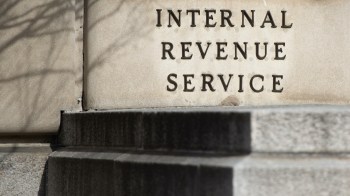Money is tight. Pretty soon some people will face one more bill they can’t pay: Taxes. What do you do if you can’t write the check?
No matter what, file your taxes with Uncle Sam. The penalties for not filing are too severe. The tax folks at CCH outline the three major debt repayment options. Because the details are important when it comes to taxes I’ll put the main choices and explanation under the fold.
1) Borrow, liquidate assets or charge to pay the debt. Taxpayers who owe and can’t pay their entire tax bill when it’s due, but can pay the full amount within 120 days, can ask the IRS for a short-term administrative extension.
Taxpayers who need more time have just a few options: They can try to secure a bank loan, such as a home equity loan, cash out a retirement account or use their credit card.
While going into debt to pay off a debt may not seem the best option, the interest rate and fees assessed by a bank or credit card issuer may be lower than the interest and penalties assessed by the IRS. Credit card payments must be made electronically, through personal tax software, a paid tax preparer or through credit card service payment providers.
Penalties for withdrawing from a retirement account may be more substantial. However, taxpayers may also want to explore this option with their tax advisor if other resources are unavailable.
2) Enter into an installment agreement with the IRS. The IRS is required to accept installment payments if a taxpayer has a good filing and payment record over the past five years, the amount owed is not more than $10,000 and it can be paid off in full within three years.
Under the new rules, the agency also is allowing small businesses to enter into “streamlined” installment agreements if their debt is below $25,000 (up from $10,000) and they agree to pay it off in 24 months. The new streamlined installment agreement is available to small businesses that file as an individual or as a business. To participate, the small business must enroll in a direct debit installment agreement.
3) Reach an offer in compromise with the IRS. In some instances, the IRS may accept less than the full amount due. This typically occurs if the taxpayer can show that the full tax debt could never be collected or they have a dispute with the IRS as to how much is owed, but neither party wants to enter into a legal battle to resolve the issue.
Under the new rules issued in February, more people may be eligible to participate in offers in compromise. Taxpayers with incomes of up to $100,000 (up from $50,000) and who have a tax debt below $50,000 (up from $25,000) can now request an offer in compromise from the IRS.
There’s a $150 fee charged for offers in compromise. Certain low-income individuals can ask for a waiver. Additionally, an initial non-refundable payment must be made with an offer in compromise.
There’s a lot happening in the world. Through it all, Marketplace is here for you.
You rely on Marketplace to break down the world’s events and tell you how it affects you in a fact-based, approachable way. We rely on your financial support to keep making that possible.
Your donation today powers the independent journalism that you rely on. For just $5/month, you can help sustain Marketplace so we can keep reporting on the things that matter to you.


















